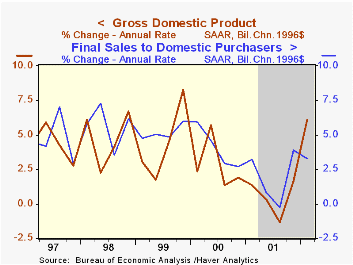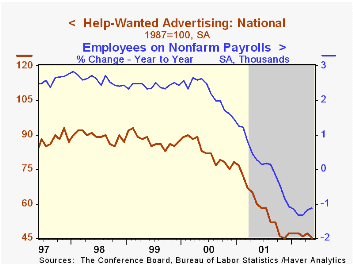 Global| Jun 27 2002
Global| Jun 27 2002Strong 1Q GDP Revised Higher
by:Tom Moeller
|in:Economy in Brief
Summary
GDP growth last quarter was revised up versus Consensus expectations for no change from the 5.6% growth reported previously. Regular annual revisions extending back several years will occur next month. The upward revision reflected [...]

GDP growth last quarter was revised up versus Consensus expectations for no change from the 5.6% growth reported previously. Regular annual revisions extending back several years will occur next month.
The upward revision reflected less of a drag from net export deterioration and firmer domestic final demand.
Trade sector deterioration sapped less from GDP growth. Export growth was revised down sharply to 2.8% but import growth was revised down more to 8.3%.
Real PCE was little changed at 3.3% (AR). Residential investment also was unchanged rising at a 14.6% rate. The decline in fixed capital investment was lessened to 6.2%. Spending on equipment and software rose for the first quarter since 3Q 2000. Government investment was unrevised at 6.7%.
Production increases to slow the rate of inventory decumulation were little revised and added 3.4 percentage points to GDP growth.
Inflation remained low in 1Q but revised up slightly.
Corporate profit growth was revised up slightly to 2.9% (AR) following a 93.4% surge in 4Q01.
| Chained '96 $, % AR | 1Q'02 (Final) | 1Q'02 (Prelim) | 4Q '01 | Y/Y | 2001 | 2000 | 1999 |
|---|---|---|---|---|---|---|---|
| GDP | 6.1% | 5.6% | 1.7% | 1.7% | 1.2% | 4.1% | 4.1% |
| Inventory Effect | 3.4% | 3.5% | -2.0% | 0.1% | -1.1% | -0.2% | -0.2% |
| Final Sales | 2.6% | 2.0% | 3.8% | 1.6% | 2.3% | 4.3% | 4.3% |
| Trade Effect | -0.8% | -1.1% | -0.1% | -0.3% | -0.1% | -0.6% | -0.9% |
| Domestic Final Demand | 3.2% | 3.0% | 3.9% | 1.9% | 2.3% | 4.9% | 5.2% |
| Chained GDP Price Deflator | 1.2% | 1.0% | -0.1% | 1.4% | 2.2% | 2.3% | 1.4% |
by Tom Moeller June 27, 2002

Initial claims for unemployment insurance fell about as expected in the latest week. The prior week's level was revised up slightly.
In a sign that rehiring may have risen, continuing claims for unemployment insurance fell sharply from the prior week's level which was revised down. Continuing claims have fallen 3.3% from the high reached in early May.
The four-week moving average of initial claims fell to 391,000, -2.8% y/y.
The insured rate of unemployment was stable at 2.9% for the third consecutive week.
| Unemployment Insurance (000s) | 6/22/02 | 6/15/02 | Y/Y | 2001 | 2000 | 1999 |
|---|---|---|---|---|---|---|
| Initial Claims | 388.0 | 398.0 | 1.0% | 405.8 | 299.8 | 297.7 |
| Continuing Claims | -- | 3,706 | 24.2% | 3,021 | 2,114 | 2,186 |
by Tom Moeller June 27, 2002

The Federal Reserve left the Federal Funds Target Rate unchanged at 1.75%, as expected.
The press release, which accompanied the Fed’s action, contained the following statement. "The Committee expects the rate of increase of final demand to pick up over coming quarters, supported in part by robust underlying growth in productivity, but the degree of the strengthening remains uncertain."
The complete text of the Fed's latest press release can be viewed at http://www.federalreserve.gov/BoardDocs/Press/monetary/2002/20020626/default.htm
Help Wanted Advertising Downby Tom Moeller June 27, 2002

The Conference Board's National Index of Help-Wanted Advertising fell unexpectedly in May. A decline in continuing claims for unemployment insurance may have suggested improved rehiring, but the drop in help wanted suggests any improvement will not be large.
During the past ten years there has been a 91% correlation between the level of help-wanted advertising and the annual change in nonfarm payrolls.
Job opportunities deteriorated across the nations' regions, but notably in the West South Central (Texas & Oklahoma) and in the East North Central (Illinois & Ohio) regions.
The figures are seasonally adjusted.
| Conference Board | May '02 | April '02 | May '01 |
|---|---|---|---|
| Nat'l Help Wanted Index | 45 | 47 | 60 |
Tom Moeller
AuthorMore in Author Profile »Prior to joining Haver Analytics in 2000, Mr. Moeller worked as the Economist at Chancellor Capital Management from 1985 to 1999. There, he developed comprehensive economic forecasts and interpreted economic data for equity and fixed income portfolio managers. Also at Chancellor, Mr. Moeller worked as an equity analyst and was responsible for researching and rating companies in the economically sensitive automobile and housing industries for investment in Chancellor’s equity portfolio. Prior to joining Chancellor, Mr. Moeller was an Economist at Citibank from 1979 to 1984. He also analyzed pricing behavior in the metals industry for the Council on Wage and Price Stability in Washington, D.C. In 1999, Mr. Moeller received the award for most accurate forecast from the Forecasters' Club of New York. From 1990 to 1992 he was President of the New York Association for Business Economists. Mr. Moeller earned an M.B.A. in Finance from Fordham University, where he graduated in 1987. He holds a Bachelor of Arts in Economics from George Washington University.
More Economy in Brief
 Global| Feb 05 2026
Global| Feb 05 2026Charts of the Week: Balanced Policy, Resilient Data and AI Narratives
by:Andrew Cates






